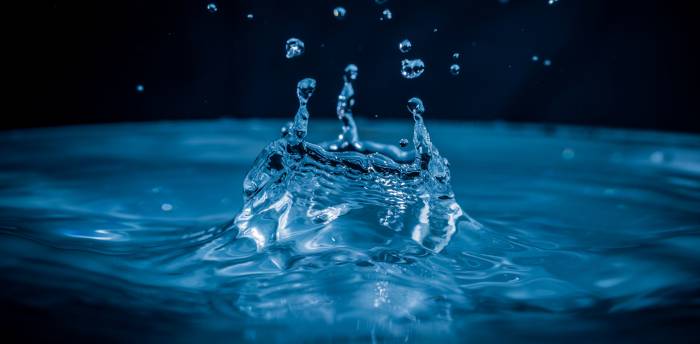One of the weirdest aspects of water is its unusual density. Normally, liquids become increasingly dense as they are cooled down, but water reaches a maximum density at about 4 degrees Celsius (39.2 Fahrenheit).
Below this point it is less dense, so when it freezes and becomes ice at 0 degrees Celsius (32 Fahrenheit), the ice is less dense than the water. This is why water ice floats, and bodies of water freeze from the top down.
But that's not all. Water also has really high surface tension - aside from mercury, it has the highest surface tension of all liquids. This is what allows water spiders to skate across the top.
To top it all off, water also has an unusually high boiling point, and the fact that so many chemical substances dissolve in it is also really peculiar, if we compare it to other liquids.
To dive into some of these bizarre properties, scientists need to drill down to the molecular level. At room temperature and as ice, water has a tetrahedral arrangement of molecules, which means every water molecule is bonded to four others in a rough pyramid shape.
Researchers from the University of Bristol alnd the University of Tokyo used a supercomputer and computer modelling to make changes in this pyramid-like nature of water molecules.
By making these adjustments, they could make water behave more like other liquids - for instance, making ice denser than liquid water, so that it sinks to the bottom.
This, the team said, worked across all of water's peculiarities - indicating that water's anomalous properties are a direct result of its special molecular arrangement.
"With this procedure, we have found that what makes water behave anomalously is the presence of a particular arrangement of the water's molecules, such as the tetrahedral arrangement," explained lead author John Russo.
"Four of such tetrahedral arrangements can organise themselves in such a way that they share a common water molecule at the centre without overlapping. It is the presence of this highly ordered arrangement of water molecules, mixed with other disordered arrangements, that gives water its peculiar properties."
Without water being the way it is, life as we know it wouldn't be possible. It doesn't compress easily, which means it can be pushed around - flowing through our veins carrying our blood cells, for instance.
And because it's such a good solvent, the water in our bodies can dissolve the nutrients we need to function. Even the low density of water ice helps life - if lakes froze from the bottom, life within them would die.
And that same low density is also why water expands when frozen - which in turn has helped shaped our planet when water seeps into rocks, freezes, expands, and breaks the rock apart from the inside.
The Universe never ceases to be an absolutely gobsmacking place.
The research has been published in PNAS.
















































